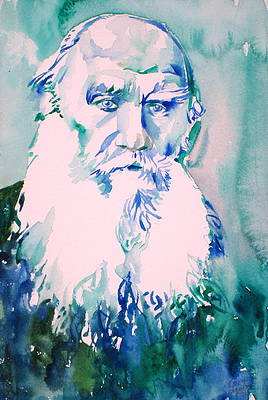Leo Tolstoy Archive
Written: 1887
Source: Original Text from Gutenberg.org
Transcription/Markup: Andy Carloff
Online Source: RevoltLib.com; 2021

FIFTH NIGHT.
The weather began to change. The sky was over-cast; and in the morning there was no dew, but it was warm, and the flies were sticky. As soon as the herd was driven in, the horses gathered around the piebald, and thus he finished his story:—
"The happy days of my life were soon over. I lived so only two years. At the end of the second winter, there happened an event which was most delightful to me, and immediately after came my deepest sorrow. It was at Shrove-tide. I took the prince to the races. Atlásnui and Buichók also ran in the race.
"I don't know what they were doing in the summer-house; but I know that he came, and ordered Feofán to enter the ring. I remember they drove me into the ring, stationed me and stationed Atlásnui. Atlásnui was in racing gear, but I was harnessed in a city sleigh. At the turning stake I left him behind. A laugh and a cry of victory greeted my achievement. When they began to lead me round, a crowd followed after, and a man offered the prince five thousand. He only laughed, showing his white teeth.
"'No,' said he, 'this isn't a horse, it's a friend. I wouldn't sell him for a mountain of gold. Good-day, gentlemen!'[12]
*
"He threw open the fur robes, and got in.
"'To Ostozhenka.'
"That was where his mistress lived. And we flew....
"It was our last happy day. We reached her home. He called her his. But she loved some one else, and had gone off with him. The prince ascertained this at her room. It was five o'clock; and, not letting me be unharnessed, he started in pursuit of her, though she had never really been his. They applied the knout to me, and made me gallop. For the first time, I began to flag, and I am ashamed to say, I wanted to rest.
"But suddenly I heard the prince himself shouting in an unnatural voice, 'Hurry up!'[13] and the knout whistled and cut me; and I dashed ahead again, my leg hitting against the iron of the dasher. We overtook her, after going twenty-five versts. I got him there; but I trembled all night, and could not eat any thing. In the morning they gave me water. I drank it, and forever ceased to be the horse that I was. I was sick. They tortured me and maimed me,—treated me as men are accustomed to do. My hoofs came off. I had abscesses, and my legs grew bent. I had no strength in my chest. Laziness and weakness were everywhere apparent. I was sent to the horse-dealer. He fed me on carrots and other things, and made me something quite unlike my old self, but yet capable of deceiving one who did not know. But there was no strength and no swiftness in me.
"Moreover, the horse-dealer tormented me, by coming to my stall when customers were on hand, and beginning to stir me up, and torture me with the knout, so that it drove me to madness. Then he would* wipe the bloody foam off the whip, and lead me out.
"An old lady bought me of the dealer. She used to keep coming to Nikola Yavlennoï, and she used to whip the coachman. The coachman would come and weep in my stall. And I knew that his tears had an agreeable salt taste. Then the old woman chid her overseer,[14] took me into the country, and sold me to a peddler; then I was fed on wheat, and grew sicker still. I was sold to a muzhík. There I had to plow, had almost nothing to eat, and I cut my leg with a plowshare. I became sick again. A gypsy got possession of me. He tortured me horribly, and at last I was sold to the overseer here. And here I am." ... All were silent. The rain began to fall.